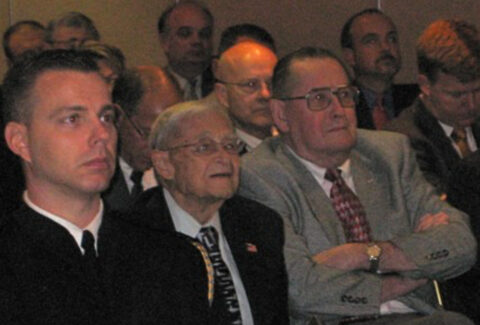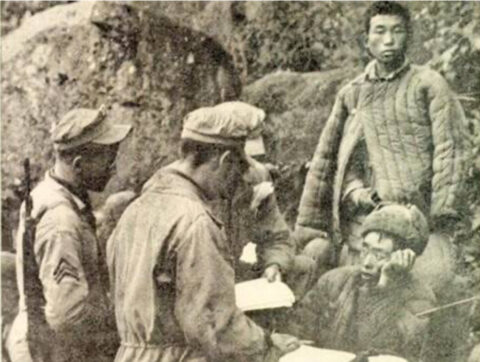Home by Christmas
02 February 2009

(Middle and right: Mac and John, 2009).
“If the Army and the Navy
Ever look on Heaven’s Scenes
They will find the streets well-guarded by
The United States Marines.”
There is a big Canadian blast of cold air coming our way on this approach of the holidays. As our title this morning we use some words spoken by a general a long time ago. We promised our pal Mac Showers that we would obey a general order from Fleet Admiral Chester Nimitz. That was the one about not speaking badly about General Douglas MacArthur. Doing so never wound up with a good result, due to the General’s legendary sense of self.
But the cold front approaching from the northwest always brings up our pal John’s story about what is really cold. We got to talking about that yesterday as the Lady in Red on the TV was explaining what the next few days were going to be like under the freezing skies.
It is not our story, but it always comes up when the weather gets tough. John’s story defines the nature of cold. It was more formally stated a dozen years ago. It went like this: “Lt. Col. John J. Guenther, USMC (Ret.) was 79 when he passed away peacefully at his residence at The Jefferson here in Arlington, Virginia. Winter was coming on in 2009.”
John went out with tradition. In mid-January of 2010, a Mass was held at the Ft. Myer Chapel. The Old Guard, 3rd U.S. Infantry, then brought the horses around to conduct a funeral with full military honors at Arlington National Cemetery. A reception followed over at the Fort Myer O’ Club. There we talked about John’s first march in the cold, and the difference between that one in 1950 and the last one in 2010. The death notice that appeared in the Washington Post didn’t have anything about the cold. Mac remembered, even though he was serving in London at the time. It was a big deal.
We bring it up this morning because of that blast of arctic air that is sweeping across the country. Freezing cold always causes us to think of John, because he and some comrades define what it is like to live- and fight- in the cold.
Mike Decker relieved John at Marine Corps HQ as chief civilian in the office of Intelligence. At the service, he had commented on a long and distinguished career this way: “John Guenther enlisted in the Marine Corps in January 1948. In September 1950, Corporal Guenther landed at Inchon with the Seventh Marines. In November and December, Sergeant Guenther was in the Division S2 (Intel) organization during the Chosin Reservoir battle.”

(This photo is from the first week of November 1950 during the battle with Chinese forces at Sudong-ni. Sergeant John Guenther is on the left.)
“He served other challenging/tough tours in Cuba, Vietnam, and East Germany. He was a great Marine who embodied the full measure and meaning of Semper Fidelis. John served more than thirty years in the Marine Corps and, upon retirement, continued to serve in a civilian capacity, rising to the civilian equivalent of Brigadier General and served as the Assistant Director of Marine Corps Intelligence.”
That is where we first met John, in the mid-1980s, in the old thread-bare Navy Annex on the bluff above the Pentagon. He was a legend even then. Based on his contributions to the Marine Corps across six decades, which included active duty and service as the senior USMC civilian, he is widely credited as the Father of modern Marine Intelligence.
On hearing the sad news, Old Salt Joe Maz commented: “John Guenther was a friend and mentor to many of us. Most importantly to me, though, he was a living connection for my WWII Marine Corps Dad who fought at Guadalcanal, Cape Gloucester, and Pelielu. There are all too few of our WWII heroes left. Semper Fi.”
There are very few left a dozen years later. In 2009, we had a chance to work with John early that year on an article he did on Strategic Surprise during the North Korean and Chinese invasions of the South. He described his reaction at seeing his first dead North Koreans hanging from an old Soviet tank, and just how cold it was walking out of what he called a place called “Frozen Chosin.”
We were naturally drawn to that project, since some of us served in Korea as well. We were lucky to be there in a time of peace, won by men like John.
We worked in an old Japanese bunker in Seoul. The maps of the 38th Parallel armistice line surrounded us down there. It was a real and constant reminder of what happened in November of 1950. Eight thousand fighters – most of them U.S. Marines – struggled to survive the coldest North Korean winter in 100 years. John was one of them. They were surrounded by 120,000 Chinese soldiers. The only lifeline was a 15′-wide, steep mountain road John called the MSR (Main Supply Route) that led to the port city of Hungnam.
The MSR was a dangerous, 78-mile journey to the Sea of Japan. John and his buddies had to make that trip under hostile fire, since Washington had been wrong about the Chinese determination to support the Communist North. The withdrawal was the longest in American military history, and would take 13 days. Those who didn’t understand what was happening called it a “retreat.” One American general simply said, “We’re attacking in a different direction.”
General MacArthur had promised that the troops would be “home before Christmas.” With their backs to the wall, the men of the 1st Marine Division pulled together to accomplish the impossible. Their teamwork came to be known as a band of brothers who called themselves: “The Frozen Chosin.”
Splash summed up what they did. “It would be like walking from our unit here in the Big Pink building all the way back to the farm, surrounded by armed and angry people shooting at us all the way. In the coldest weather in a century.”
John and the other members of the Frozen Chosin crew will always be remembered when the weather is like this. And the courage they displayed with every footstep on a long and dangerous road.
We will toast their memory later, when the hour is suitable to lift a drink. We will frame that toast with another two words that sum up our respect to those who marched with John:
“Semper Fideles.”
Always Faithful.
Copyright 2022 Vic Socotra
www.vicsocotra.com
